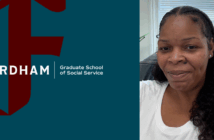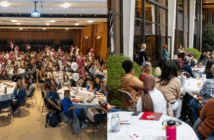Sharon Cohen Bunkin, ’26, comes to social work from a career in marketing that spanned the publishing, technology, and education sectors. After volunteering at ReelAbilities, a nonprofit organization celebrating disability through film, she realized that while marketing had its upsides, her true calling was in service work. Now, she is a Master of Social Work student at Fordham, pursuing a career dedicated to helping others, all while continuing to volunteer in her eighth year at ReelAbilities. This spring, Sharon co-chaired the opening night reception of the annual ReelAbilities Film Festival in New York and serves on its Advisory Board and Film Screening Committee.
We sat down with Sharon to discuss changing careers, what people should know about disability justice, and how the connections she’s made at Fordham are helping advance her path to advocacy in creative mediums.
What did you do in your previous career prior to pursuing social work?
I worked in marketing until now. Most recently, I helped with the launch of a hearing health app to promote awareness of noise-induced hearing loss. Before that, [I worked] in varied industries including education, publishing, and financial services.
Why do you want to be a social worker?
I really love the creativity behind branding and communications in marketing, yet found myself drawn away from corporate industry brands and toward mission-driven work. This led me to a realization that working more closely and directly with individuals through social work, while still using the communication skills from marketing, was a natural evolution.

Photo courtesy of Sharon Cohen Bunkin
Why did you choose Fordham for your MSW?
The program’s reputation for excellence. I have some friends who are further along in the program or have just graduated, and a mentor who’s in clinical therapy and made the recommendation. The program is really well-established; I was eager and excited to be a part of the Fordham community.
How did you first get involved with ReelAbilities?
A former colleague of mine knew I had an interest in disability justice and introduced me about 8 years ago to the director of the ReelAbilities festival. We formed a friendship, and I became very drawn to the work they’re doing. It’s an amazing team; I love being a part of it.
What does being on the Film Screening Committee look like? What are your responsibilities?
The Committee consists of approximately 20 members. We screen dozens of shorts and feature films during a film submission window of a few months. Submissions come from filmmakers all over the world from diverse genres, budgets, and levels of industry expertise. We rank the films based on their portrayal of disability: whether it was realistic, sensitive, and progressive. We also consider the production value and overall impression of the work. Our top ten choices are then submitted to the Selection Committee for final review.
What was it like co-chairing the opening night celebration of the ReelAbilities Film Festival?
It has been an honor to co-chair opening night for ReelAbilities. This year marked a number of milestones, including the Festival operating as an independent nonprofit in its 17th year. It’s great to bring in people who aren’t from the community to experience ReelAbilities, its mission, and the power of the films.
In addition, we celebrated a partnership with the NYC DOE Special Education Office, which provides free access to ReelAbilities films created by and for individuals with disabilities that focus on disability and deaf culture, emphasizing the importance of fostering an inclusive, anti-ableist culture within schools and amplifying the voices of those with lived experiences. Personally, I would love to see the programming expand to higher education and perhaps within GSS.

Photo courtesy of Sharon Cohen Bunkin
How does ReelAbilities’s mission resonate with your values as a social work student?
The mission of ReelAbilities is to reframe disability through the power of film. The films authentically represent disability storytelling, promote opportunities for disabled creators, and foster inclusive and fully accessible spaces. The films, events, and conversations of ReelAbilities break down barriers, drive meaningful change, both on and off the screen. Disability justice in social work feels directly linked to the mission of the festival.
What is something about disability justice that you think everyone should know?
In discussions about equity and intersectionality, I feel disability is a population that feels overlooked and misunderstood.
I chose to write my first policy paper on Section 504 of the Rehabilitation Act of 1973. It’s important to recognize that protection against discrimination based on disability wasn’t included in the Civil Rights Act of 1964. Advocacy was required for nearly a decade to provide civil rights protections for people with disabilities
We should progress away from the medical model and thinking that all disability needs to be fixed and helped by non disabled people. In film, we think about the hard-to-watch disability tropes in film and media that still manage to happen today: we see [the]Angry Disabled Person [trope], infantilizing intellectually disabled characters, [as if]they are here to make you feel better about yourself when you care for them. [The stereotypes say people with disabilities] are childlike and deserve patronizing treatment, or that being disabled is a miserable existence.
To me, disability justice in social work means moving away from a charity-oriented framework, which still exists, to reframe the thinking in a collaborative, community-forward conversation. The stigmas of pity bother me the most.
Policy still has gaps, advocacy is needed, and perceptions have room to evolve to be more inclusive and celebratory of diversity, including physical disability, neurodivergence, mental illness, and chronic illness differences. Film can advance this cause by shifting cultural perceptions.
What’s been a highlight moment of the MSW program so far?
Connecting with Dr. Jenn Lilly about her short film Nuestro Apoyo.
I read about Dr. Lilly’s film, which touches on mental health in the Latina community, in a GSS faculty Spotlight and felt it would be a great project to submit to ReelAbilities. In addition to talking about her film, we spoke about Dr. Lilly’s research on the impact media can have on audience perceptions, and how that data can be used to support the strategic goals of a festival such as ReelAbilities.
What advice would you give someone interested in switching careers to social work?
Getting some volunteer or community service experience before making your decision will get you good exposure and reaffirm that this is something you love doing. The volunteer work with the ReelAbilities festival did that for me.



